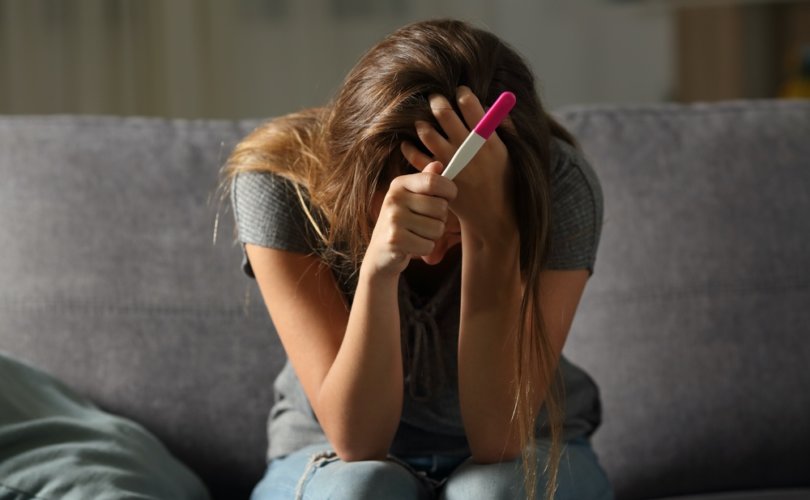(LifeSiteNews) – More than half of all women who abort their children did so because of some form of outside pressure, according to a new study from the Charlotte Lozier Institute.
In January, the Charlotte Lozier Institute (CLI), the research and education branch of Susan B. Anthony Pro-Life America, released a peer-reviewed study that they conducted last October. The study, which interviewed 1,000 women in the United States, revealed that 61% of women who undergo abortions do so due to pressure from “male partners, family members, other persons, financial concerns, and other circumstances.”
“Perceived pressures to choose abortion should be assessed before an abortion to better guide risk assessments, decision-making, and analyses of post-abortion adjustments in light of these risk factors,” the study stated.
“A history of abortion, especially when there was pressure to abort, is associated with more stress completing questionnaires touching on abortion experiences and with a higher dropout rate, a finding that is consistent with the view that abortion surveys are likely to underrepresent the experiences of the women who experience the most stress and negative reactions to their abortions,” it continued.
The study was conducted through surveys of 1,000 women in the United States between the ages of 41 and 45. Of them, 226 had a history of abortion, and the study revealed that 61% of those post-abortive women experienced “high levels of pressure” during the decision process.
Among study participants with a history of abortion, CLI discovered that “perceived pressure to abort was significantly associated with more negative emotions; more disruption of daily life, work, or relationships; more frequent thoughts, dreams, or flashbacks to the abortion.”
The study also found that women who had been pressured to have an abortion experienced “more frequent feelings of loss, grief or sadness about the abortion; more moral and maternal conflict over the abortion decision; a decline in overall mental health that they attribute to their abortions; [and] more desire or need for help to cope with negative feelings about the abortion.”
READ: The dirty secret: Coerced abortion, lack of ‘choice’ commonplace in UK
David Reardon, Ph.D., director of the Elliot Institute and an associate of CLI who served as the lead author of the study, said in a statement that “abortion clinics cannot claim to be pro-woman while at the same time allowing the majority of their clients to be pressured into unwanted abortions.”
“In a country torn by political debate over abortion, surely these findings underscore one point on which we should all be able to agree,” he continued. “No woman should ever feel pressured into accepting an unwanted abortion. Clearly, abortion clinics need to provide better pre-abortion screening and counseling in order to prevent unsafe and unwanted abortions.”
The reality behind CLI’s findings is only further verified through similar past studies that have shown that more than half of all women who receive abortions do so on account of pressure.
A report provided by the Elliot Institute revealed that 64 percent of women who receive abortions reported that they felt pressured, and that they were “rushed and uncertain,” when they went through with their abortion. Likewise, 79 percent of post-abortive women are not aware of the resources and alternatives that are available to them. The report also states that “suicide rates 6 times higher after abortion,” and that “65% of women suffer trauma symptoms after abortion.”
Another similar study, conducted from 2012-2013 and published by the Journal of American Physicians and Surgeons, found that three-quarters of all women who have experienced abortions said that there was some level of pressure placed on them which ultimately influenced their decision to abort.
“Most abortions are unwanted are coerced and many are forced, sometimes violently,” the report, a collection of abortion-related data, stated. “Escalating pressure to abort can come from employers, husbands, parents, doctors, partners, profit-driven abortion businesses, landlords, friends and family, or even trusted financial, personal, school or religious guides, gatekeepers or authorities.”
“They may be negligent in telling young or vulnerable individuals or couples about available resources,” it continued. “They may misrepresent information or present false information as fact. They may threaten or blackmail.”
READ: New UK study reveals alarming rate of coerced abortions, women unknowingly taking abortion pill

